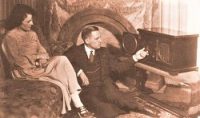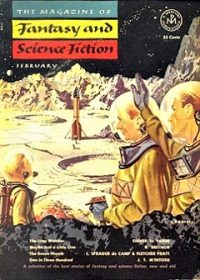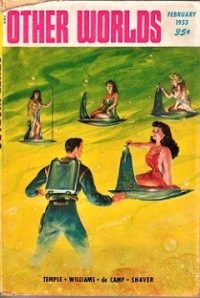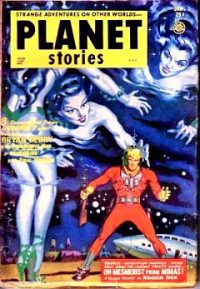
 Tired of the everyday grind?
Tired of the everyday grind?
Ever dream of a life of … romantic adventure?
Want to get away from it all?
We offer you … ESCAPE!
Escape (1947-1954) aired “I Saw Myself Running” on February 22, 1953 as the show’s 171st episode. Not surprisingly, we have aired many episodes of this top-shelf program over the past 11 years, the last two being in April and August of 2020. A spinoff and sister show of the highly popular radio program Suspense (1942-62), Escape produced (according to one source) 251 episodes of which 241 were unique stories, plots, or scripts. Escape concentrated on adventure tales, some with an SF/F theme, though the straight adventure tale set in exotic locales was its meat and potatoes. Escape soon established itself with an even more focused approach to action and exotic adventure, dramatizing literary classics (from such as Rudyard Kipling, Sir Arthur Conan Doyle, Edgar Allan Poe, Ambrose Bierce, Nelson Bond, Ray Bradbury, Eric Ambler, Jack London and others) while at the same time treating its audience to many brand new tales, a fair number of which have become radio classics. In fact, some of Escape‘s original shows were so well written, acted, and produced they were later reincarnated for episodes of Suspense.
While strangely not consistently supported by its host network CBS, that rarely gave advance notice of upcoming program titles and moved the show to different times and days willy-nilly no fewer than 18 times over its 7-year run, the show found a faithful audience, and continued to produce well-written scripts with many of the finest actors in radio.
“I Saw Myself Running” was written by prolific writer Antony Ellis and stars his wife, actress and radio personality Georgia Ellis (best known for her role as Kitty on radio’s Gunsmoke), who turns in an outstanding performance. It begins in rather mundane fashion when a woman is plagued by a peculiar dream that turns darker and more frightening each time it is dreamt. Ere long the script turns into something far more sinister with a psychological angle adding depth, and is played to the hilt by the troubled woman who now experiences bouts of ever-growing hysteria as her dream turns nightmarish beyond anything she could have imagined. The denouement is perfectly executed and caps off what could have been an average, rather familiar story-line, but due to Antony’s script and Georgia’s realistic performance it becomes something memorable and more satisfying. Following the story there are a couple of minutes of ads and a note on the next week’s episode. Unfortunately, the audio on these final few minutes only are of poor quality; thankfully the entirety of the episode preceding the poor audio itself is unaffected. Enjoy this well written and acted drama where a traumatized woman describes to her husband that in her dream “I Saw Myself Running.”
Play Time: 27:54
{The cold weather in February of 1953 couldn’t stop the neighborhood gang from heading to the corner newsstand to warm their imaginations with their favorite form of escape, their SF magazines. The Magazine of Fantasy and Science Fiction (1949-present) was a relatively newcomer on the SF magazine block, but was attracting an ever-larger readership with each issue. Begun as a quarterly late in 1949, 1953 was its first full year as a monthly. Other Worlds (1949-53) also saw its first issue in late 1949. Another of Ray Palmer’s short lived publishing ventures, it ran into financial troubles and folded with its July 1953 issue. Its schedule had always been erratic, but with its October 1952 issue until its demise it had an unbroken string of 10 monthly issues. The veteran of this group of magazines, Planet Stories (1939-55) was one of the last of the popular pulp magazines that are now much beloved of science fiction fans and collectors. Noted for its colorful adventure science fantasy fare where imagination ruled over hard science, while it paid less than the top tier magazines of the time it nevertheless attracted some of the biggest names in the SF firmament, including Ray Bradbury, Leigh Brackett, occasionally Isaac Asimov and Arthur C. Clarke, and even published Philip K. Dick’s first sale. A quarterly from 1939-1950, it was a bi-monthly in 1953.}
[Left: F&SF, Feb. 1953 – Center: Other Worlds, Feb. 1953 – Right: Planet Stories, Jan. 1953]



To view the entire list of weekly Old Time Radio episodes at Tangent Online, click here.